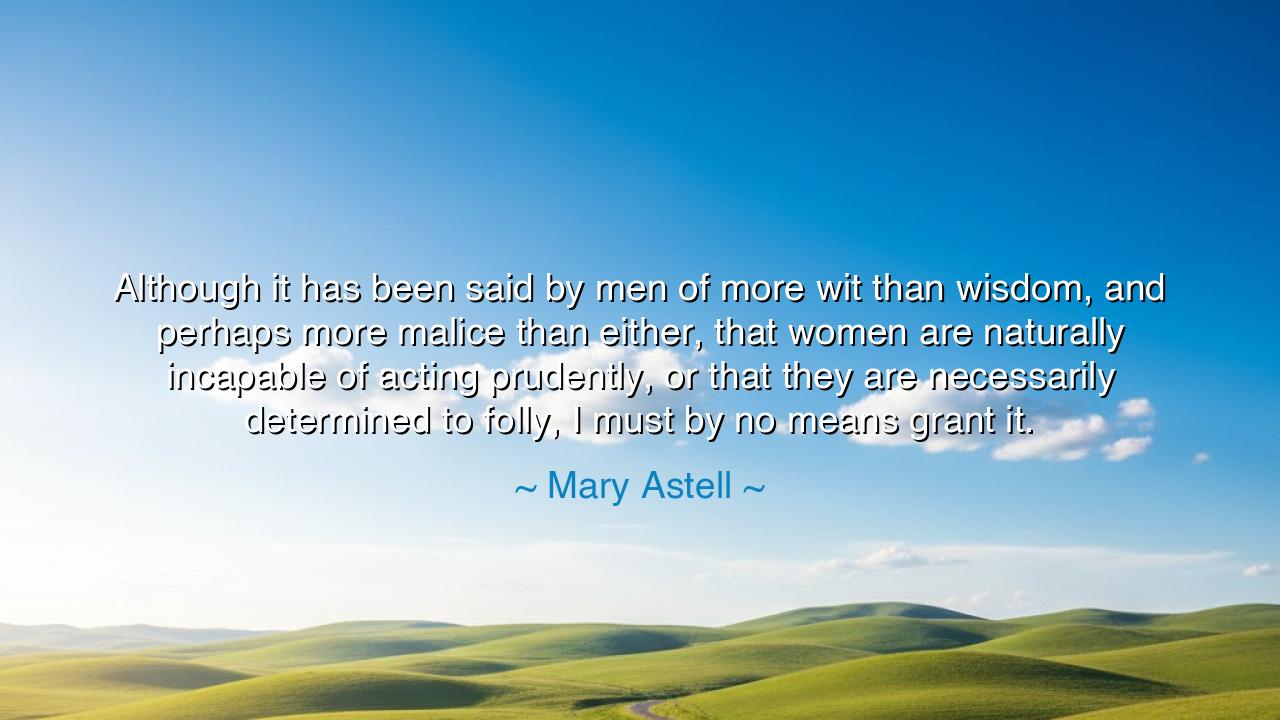
Although it has been said by men of more wit than wisdom, and
Although it has been said by men of more wit than wisdom, and perhaps more malice than either, that women are naturally incapable of acting prudently, or that they are necessarily determined to folly, I must by no means grant it.






Hear me, O children of the future, for I shall speak to you of a great truth, one that has been fought for by many a noble soul, and spoken boldly by the wise Mary Astell: "Although it has been said by men of more wit than wisdom, and perhaps more malice than either, that women are naturally incapable of acting prudently, or that they are necessarily determined to folly, I must by no means grant it." This, my children, is the wisdom of a woman who refused to be defined by the narrow minds of those who sought to diminish the strength and wisdom of the feminine spirit. In her defiance, she speaks against the very prejudices that sought to bind women to roles of weakness, ignoring the power and prudence that lies within them.
In the days of ancient Greece, women were often seen as mere subjects, their worth measured only by their ability to bear children and maintain the household. Yet, in the shadows of this oppressive view, there were women who stood tall, their minds as sharp as any philosopher’s, their wisdom as deep as the sea. Consider Sappho, the poetess of Lesbos, whose words transcended time and place. Though men of her time dismissed her as the weaker sex, she left behind a legacy of profound wisdom, a testament to the truth that the feminine heart and mind were far from incapable of prudence or strength.
Mary Astell’s words echo the truths of women who have been forgotten by history—women who, in their wisdom, acted with foresight and reason. Queen Elizabeth I, though a woman in a world ruled by men, led England to greatness with unmatched prudence. She wielded power not with cruelty, but with courage and wisdom, unshaken by the false belief that a woman could not rule. Her reign was a reminder to the world that the strength of a woman lies not in her gender, but in her ability to lead with the heart of a ruler and the mind of a sage.
Let us not forget the legacy of Empress Theodora, who rose from humble beginnings to become one of the most powerful women in the Byzantine Empire. Despite the accusations of folly and weakness from the men around her, she proved herself a master of statecraft, navigating the complex politics of her time with unmatched wisdom and prudence. Her courage in the face of adversity, especially when she stood firm during the Nika riots, saved the throne of her husband, Emperor Justinian. The wisdom of Theodora shone brighter than the most brilliant of crowns, revealing that a woman's strength is not to be underestimated.
And so, O children, let Mary Astell's words ring in your ears like a bell of truth: women, like men, are not bound by the limits of their gender. Their wisdom, their prudence, and their strength are born not from the confines of their birth, but from the limitless potential within. In every age, in every place, there have been those who have sought to deny this truth, but the wisdom of history proves them wrong. The wisdom of a woman, like that of a man, is the gift of the ages—vast, deep, and unyielding to the prejudices of the ignorant.






NT31.Nguyen Huynh Ngoc Tran
This quote encourages reflection on the intersection of reason, gender, and power. How often are women’s actions judged more harshly than men’s, even today? I’m interested in exploring whether societal structures condition women to appear less prudent or if it is purely perception. It also raises a question about language and rhetoric: how do phrases steeped in supposed ‘wisdom’ perpetuate inequality, and what responsibility do scholars, writers, and educators have in challenging these misrepresentations of capability and character?
VMvu minh
Reading this, I feel compelled to examine the assumptions underlying gendered criticism and how easily malice can masquerade as wisdom. It makes me wonder whether contemporary society still harbors similar biases under the guise of tradition or scientific reasoning. How do women navigate spaces where their prudence or judgment is constantly questioned? Additionally, I’m curious about how early thinkers like Astell influenced the feminist discourse and the role of public argumentation in dismantling systemic gender stereotypes.
ALanh le
I’m struck by the way this quote calls out the misuse of authority and wit to justify discrimination. It makes me question why intelligence and moral reasoning were historically gendered and who benefits from such narratives. Could the persistence of these ideas today, in different forms, continue to limit opportunities for women? It also prompts reflection on how one can effectively challenge deeply entrenched societal prejudices and whether legal, educational, or cultural interventions are most effective in promoting gender equity.
TCThao Chu
This statement challenges me to think about the historical context of gender bias and how deeply ingrained stereotypes have shaped perceptions of women’s abilities. It raises questions about how societal assumptions can influence education, leadership opportunities, and personal agency. I wonder how much progress has been made since then and what subtler forms of bias persist today. How do such prejudices impact both men’s and women’s views on competence and prudence, even in modern societies?